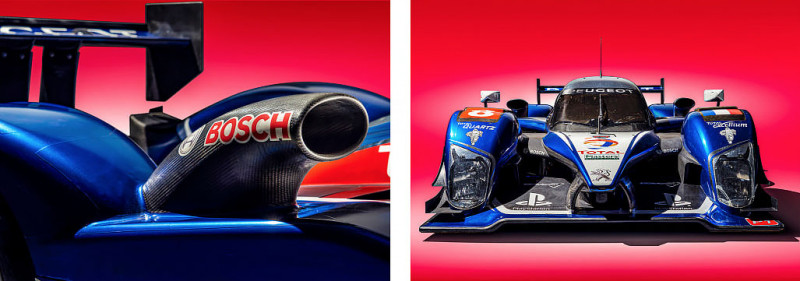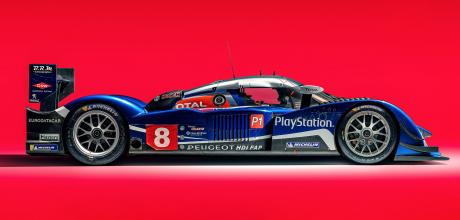2010 Peugeot 908 HDi FAP
Audi and Peugeot pushed diesel to its peak… but soon Toyota was racing itself
VIVE LA FRANCE (BRIEFLY)
The 24 Hours of Le Mans doesn’t divide flawlessly into decades, so allow us to indulge you in the era of diesel, as these racing oddities dominated from the mid 2000s until Porsche finally broke the chokehold in 2015 and ushered in the petrol-hybrid age. Fast, reliable, economical (at least for a racing engine) and with road cars to sell on a Monday, it’s easy to see why Audi – and then Peugeot – went diesel. They were like otherworldly spaceships on track too, gliding around La Sarthe accompanied by little more than a futuristic whoosh.

First out of the blocks was the Audi R10 TDI, which won at Le Mans on its debut in 2006. The 5.5-litre V12 delivered around 650bhp, more than 800lb ft, covered over 4000 miles in practice, qualifying and the race, and was surprisingly clean, as Ralf Jüttner, team director of Audi Sport Team Joest, recalls: ‘Ulrich Baretzky, head of race engine development, walked up to the winning car with paper napkins in his hands. He wiped the inside of the tailpipes and afterwards the napkins were as pristine-white as before.’
Peugeot joined the fray in 2007, with an equally large V12, but despite out-qualifying Audi that year and the next, its cars faltered in the races. Third time round Peugeot came good, with pole and a 1-2 finish, besting Audi’s new 5.5-litre V10 R15 – and 2010 looked to be better still, as Peugeot locked out the top four spots in qualifying. Anthony Davidson, ex-Formula 1 racer and now Mercedes F1 sim driver, drove for Peugeot that year and adored the 908 HDi: ‘It was the first car I’d ever driven that was relatively close to Formula 1 performance.
The power was really silky smooth. Loads of torque, way more than an F1 car. You felt you could be in any gear, it didn’t really matter, it was just going to pull. It was just an absolute joy to drive. Something totally different, with huge downforce. I loved it.’
Le Mans didn’t work out, though, as in its push to stay ahead of Audi, Peugeot’s new engines failed. Davidson went on to join Toyota in 2012, and raced with them through 2017, winning the FIA World Endurance Championship title in 2014, but it’s the 908 he looks back most fondly on: ‘If I could choose one car from my whole career that suited my driving style the most, a car that every time I got in I could dominate, feel brilliant in and deliver great lap times, it would be the 2010 car.’
The race went Audi’s way with a 1-2-3, with all three R15s breaking the distance and average speed records Porsche had held since 1971. It was quite a statement for the prowess of diesel, but things soon unravelled. Peugeot pulled the plug on its racing programme in January 2012, inspired by PSA Peugeot Citroën needing to save €800m and shed 6000 jobs. And while Audi would win in 2011, ’12, ’13 and ’14, it too quit in late 2016, the Dieselgate scandal seeing it switch to PR-friendly Formula E. Diesel was dead at Le Mans.
2010S: THE ROAD TO HYBRID
The ACO announced new hybrid regulations in 2010, but Peugeot quit before its new 90X could ever race.
Enter Toyota, early. Having planned to compete at select events through 2012, ahead of a full season in 2013, hurried meetings with the FIA saw the Japanese manufacturer take one for motorsport and fill the French void. But the results were disappointing, with both cars out at Le Mans before the halfway point.
The hybrid regulations finally came to the fore in 2014, with Toyota (naturally aspirated V8, above), Porsche (turbo’d V4) and eventual winners Audi (turbodiesel V6) all lining up with vastly different powertrains. Even more promising was 2015, with Nissan fielding its innovative GT-R LM Nismo – but it never raced again after an embarrassing debut. Porsche won that year, and for the next two, but as costs spiralled to an estimated £200m annually, it switched to Formula E.
That left Toyota all alone, and while some grumble that its first (and subsequent) wins came against meagre opposition, it kept top-tier prototype endurance racing afloat in the latter half of the decade.
TECHNICAL DATA 2010 PEUGEOT 908 HDI
- ENGINE 5.5-litre twin-turbo V12 diesel
- MAX POWER 700bhp+
- MAX TORQUE 900lb ft+
- TRANSMISSION Six-speed sequential paddleshift
- LAYOUT Mid-engined, rear-wheel drive
- CONSTRUCTION Carbonfibre monocoque with closed-cockpit carbonfibre body
- WEIGHT 930kg (est)
- LAP TIME 3min 19.0 seconds (outright fastest in 2010 race)
Diesel the only link to roadgoing Peugeots. V12 engine wanted a lot of air, and quickly.


